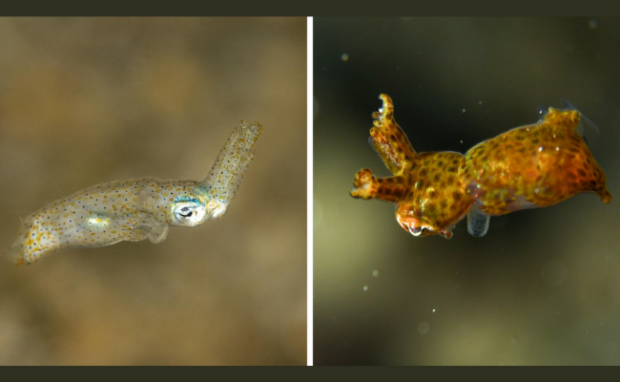New pygmy squid species found in Japan
Two new species of pygmy squid have been found in the waters of Okinawa Island. They are the Ryukyuan pygmy squid (Idiosepius kijimuna) and Hannan’s pygmy squid (Kodama jujutsu). These cephalopods are smaller than paper clips and live in seagrass fields and coral beds. However, the researchers admit they don’t know where they go during summer.
It’s great to learn more about our world; discovering these new pygmy squid species will give us more insights. Also, we might find ways these creatures could have real-life applications, such as the horseshoe crab’s blood’s role in testing vaccines. More importantly, we could develop measures to safeguard it from climate change.
This article will elaborate on the newly discovered pygmy squid species. Later, I will discuss other rare animals found in other parts of the world.
What do we know about the pygmy squids?

Okinawa Institute of Science and Technology (OIST) researchers discovered two pygmy squid types: the Ryukyuan Pygmy Squid and Hannan’s Pygmy Squid. Interestingly, they named them after Japanese folklore characters based on their behavior.
They gave the Ryukyuan Pygmy Squid the scientific name Idiosepius kijimuna. The “kijimuna” is a short, red-haired forest fairy that lives in the banyan trees of Okinawa.
Like its namesake, the Ryukyuan Pygmy Squid is a tiny, red creature that usually spends time in its forest habitat. It latches onto vegetation in shallow seagrass beds near the coast.
On the other hand, Hannan’s Pygmy Squid’s scientific name is Kodama jujutsu. The “Kodama” is a round-headed spirit that lives in ancient trees. Seeing them indicates a healthy forest.
The “Jujutsu” refers to the Hannan’s Pygmy Squid’s preying behavior. Also, it alludes to the Japanese martial art, “jiujutsu.” Phys.org says it “revolves around grappling and using your opponent’s strength.”
Similarly, the pygmy squid species prey on larger shrimp by grappling with its small arms. OIST’s Jeffrey Folly also said he and his colleagues noticed it adopts a martial-arts-like pose.
You may also like: How to boost learning with ChatGPT
It raises its arms and curls them above its head. Moreover, the researchers said it was tricky to spot these critters. Both species have a maximum length of roughly an inch or 1.2 cm.
They are only active at night, and the Ryukyuan only appears in winter. Researchers found the latter in 2018 but did not have enough specimens to write a formal description at the time.
The Hannan’s is more elusive because it only stays in coral reefs. Jolly explains, “There are so many other things to look at that finding a small squid the size of a pinky fingernail is not easy.”
What are the other recent animal discoveries?

Researchers found another amazing animal discovery in Brazil: a dog-fox hybrid. National Geographic named it “Dogxim,” a combination of the words “dog” and “graxaim do campo,” or Pampas fox.
First, they counted its chromosomes to confirm whether it was one-of-a-kind. It would have the same chromosome count as other known animals if it weren’t a unique hybrid.
The experts determined the dog-fox had 76, which is the same as the maned wolf or Chrysocyon brachyurus. However, its characteristics disqualified it as a possible parent of this hybrid.
Domestic dogs have 78 chromosomes, and Pampas foxes have 74. Consequently, scientists believe the dog-fox hybrid’s 76 chromosomes may indicate “the first evidence of the hybridization.”
Second, geneticists checked its mitochondrial DNA, which would exclusively originate from its mother. They discovered it came from a Pampas fox. Examining its nuclear DNA revealed genetic information from a Pampas fox and a dog.
Biologist Roland Kays highlighted how unique this dog-fox cross is. “Generally, in mammals, species breed with their own kind. Sometimes, if they haven’t been separated by that long of an evolutionary time period, you can get different species breeding.
You may also like: Chinese scientists create chimera monkey with glowing fingertips
“We see this happen with coyotes and wolves, occasionally, but this tends to occur when one of the animals is very common in a region, and the other is very rare.”
Rafael Kretschmer from the Universidade Federal de Pelotas shared ways a dog and a Pampas fox met and bred. First, Pampas foxes may have spread into domestic dog territory after losing their natural habitat to cattle ranches and human settlements.
The overlapping territories give them more opportunities to mate. Also, Dogxim study co-author Bruna Szynwelski said abandoned dogs could be another factor.
Conclusion
Researchers discovered new species of pygmy squid on Okinawa Island. The Ryukyuan Pygmy Squid and Hannan’s Pygmy Squid were difficult because they were tiny and only came out at night.
Phys.org says they are under threat due to human activity. Specifically, we cause climate change that heats up oceans and causes coral bleaching.
We must identify these animals to discover how to protect them from extinction. Learn more digital tips and trends at Inquirer Tech.